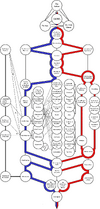VilnaGaon
Puritan Board Sophomore
Dr Flowers on YouTube has a video claiming that Calvin taught Equal Ultimacy and that doctrine is heresy.
But does not Romans 9.22-24 teach Equal Ultimacy??
Does not the text explicitly state that GOD prepares some for Destruction(also Prov 16:4)
while at the same time and manner, GOD prepares some for Glory?
But does not Romans 9.22-24 teach Equal Ultimacy??
Does not the text explicitly state that GOD prepares some for Destruction(also Prov 16:4)
while at the same time and manner, GOD prepares some for Glory?

